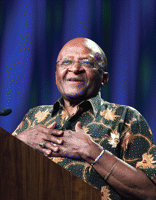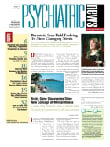"There is no future without forgiveness, within nations and between nations," Archbishop Emeritus Desmond Tutu told those attending the Convocation of Fellows at APA's annual meeting in Honolulu in May.
Forgiveness and truth telling moved Tutu's native South Africa through the transition from apartheid to freedom and democracy. Without a commitment to those concepts, the transition might have been a "ghastly bloodbath that would have overwhelm[ed] our beautiful land," he said.
His address was repeatedly interrupted by applause from an audience that filled a 2,500-seat hall and a nearby room equipped with closed-circuit television.
Instead of revenge and retribution, as cynics expected, South Africa created "truth and reconciliation" commissions to hear the grim stories of the victims and the perpetrators of apartheid-era atrocities committed by both the white regime and its sometimes-violent opponents.
"The people who did that didn't have horns and tails," said Tutu. "They were human beings like you and me."
Recognition of the humanity of those on both sides of the apartheid barrier was essential, he said. He recounted the story of a white woman injured so badly in an antiapartheid bombing that she could no longer bathe, feed, or clothe herself. She told her story, saying that she only wanted to meet the perpetrator to forgive him and to ask him to forgive her.
No one can say truthfully that they would not have committed such crimes if placed in the same circumstances, he said. "We didn't know the depths of depravity into which we can descend."
South Africa avoided two unsatisfactory ways of dealing with the crimes of the apartheid regime. The new legislature could have passed a general amnesty and let bygones be bygones, Tutu told the audience.
"But you know that bygones have a capacity to come back and haunt us," he said to knowing laughter from an audience familiar with their patients' attempts at dealing with bygones.
Some wanted to see perpetrators hauled into court, as happened at the Nuremberg trials of Nazis after World War II. However, that was a case of the victors trying the defeated.
"In our case, neither side defeated the other," he said. "If there were to be trials, the security apparatus would have scuttled any agreement leading to majority rule."
The two sides thus reached a compromise: individual amnesty for those who recounted their misdeeds, coupled with not setting a precedent for dealing with future crimes.
This formulation, accompanied by full disclosure of the facts regarding particular crimes, was a political solution that permitted the transition from repression and injustice to democracy and freedom, Tutu stated.
However, when their work was finished, the commissioners were surprised to find that they were not weighed down by anguish and pain. Rather, they had a new understanding that human beings were essentially good.
"Even the worst culprit remains a child of God, and even the worst of us has the power to become better." he declared. Victims could not sit in judgment over lesser mortals; they could only be wounded healers.
"Our world is waiting for such as you," said Tutu, addressing the healers in the audience. "We are all made for goodness, for gentleness, for compassion, for laughter, for caring. That is what God created us for."
As he wrapped up his lecture, Tutu received a long, standing ovation from an audience clearly moved—many to tears—by his plea for reconciliation among former enemies and perhaps even by the way in which he presented his message—using words that bespoke a tenacious faith in the ultimate goodness of humans, delivered with humility and a gentle sense of humor.
"This was an extraordinary opportunity to hear from an extraordinary man about how we can relate to each other as human beings," outgoing APA president Carol Bernstein, M.D., who invited Tutu to speak, said afterward. "It changes the environment when you look for what's good in people."

